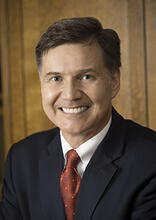Daniel Esty

Daniel Esty
Dan Esty is the Hillhouse Professor at Yale University with primary appointments at Yale’s Environment and Law Schools and a secondary appointment at the Yale School of Management. He serves as director of the Yale Center for Environmental Law and Policy and co-director of the Yale Initiative on Sustainable Finance. Professor Esty is the author or editor of twelve books and dozens of articles on environmental protection, regulatory reform, energy policy, and sustainability metrics – and their connections to corporate strategy, competitiveness, trade, and economic success.
His prizewinning volume, Green to Gold: How Smart Companies Use Environmental Strategy to Innovate, Create Value, and Build Competitive Advantage, was recently named the top “green business” book of the past decade. His current research and writing offers cutting-edge thinking about climate change, sustainable investing, innovation in the energy/environmental context, corporate sustainability, and new approaches to environmental protection – including a widely hailed article, “Red Lights to Green Lights: From 20th Century Environmental Regulation to 21st Century Sustainability” as well as a 2019 edited book, A Better Planet: 40 Big Ideas for a Sustainable Future.
From 2011 to early 2014, Professor Esty served as Commissioner of Connecticut’s Department of Energy and Environmental Protection where he earned a reputation for fresh thinking and practical results. His policy innovations include the launch of Connecticut’s first-in-the-nation Green Bank to promote clean energy using limited public funding to leverage private capital and the “LEAN” restructuring of all of Connecticut’s environmental permitting programs to make the state’s regulatory framework lighter, faster, more efficient, and effective. Prior to taking up his Yale Professorship in 1994, Professor Esty served in a variety of senior positions at the US Environmental Protection Agency where he helped to manage the agency’s regulatory programs and negotiate the 1992 Framework Convention on Climate Change. He also worked as a senior fellow at the Peterson Institute for International Economics in Washington, D.C., where he did breakthrough work on the links between trade and environmental issues and the broader challenges of globalization.